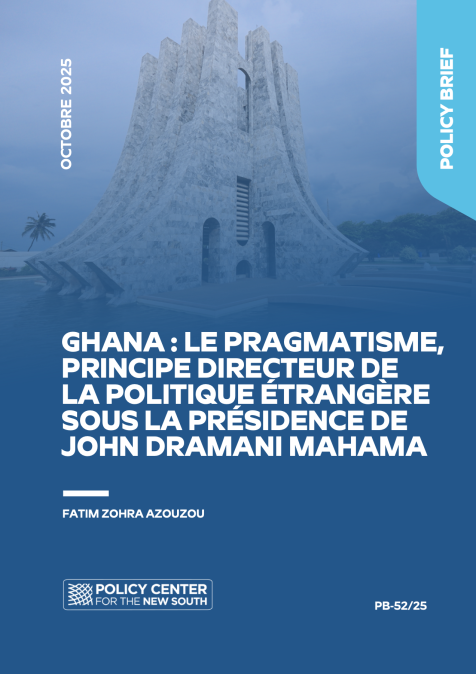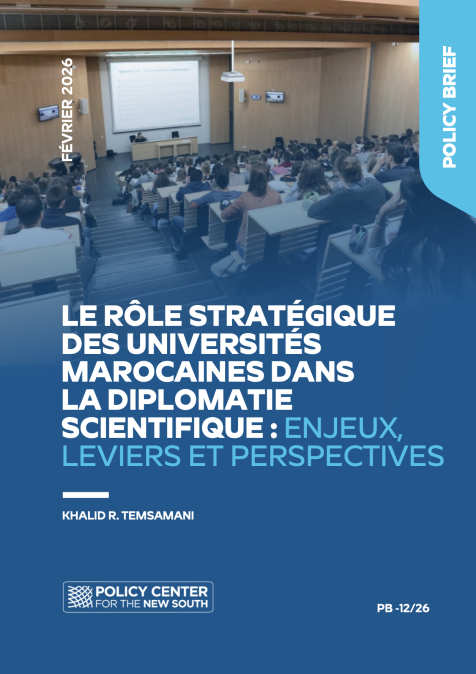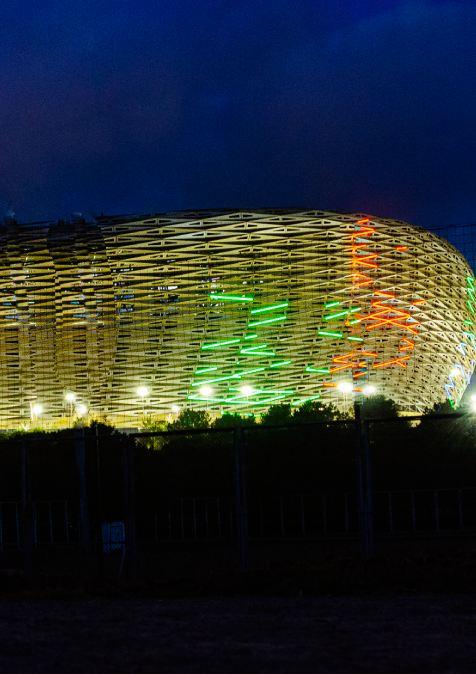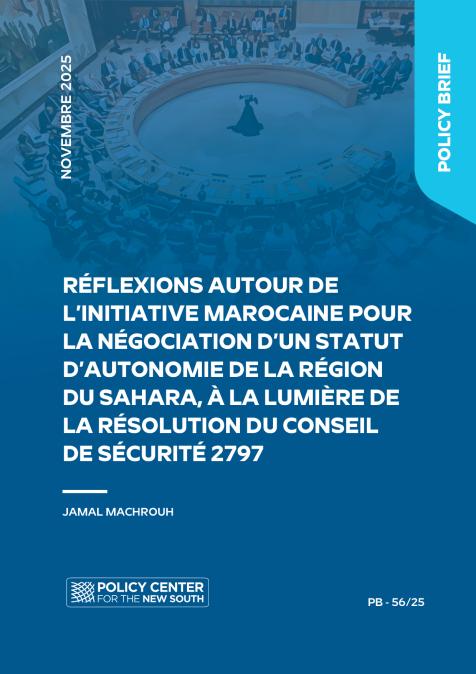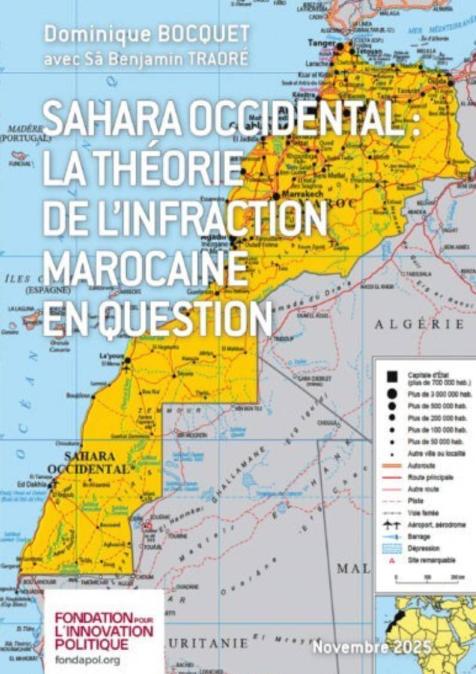Publications /
Policy Brief
Ghana’s President John Dramani Mahama has made pragmatism the orienting principle of his foreign policy to reach a dual goal: (a) economic recovery, and (b) containment of the terrorist threat. Two recalibrations illustrate this shift. First, strategic convergence with Morocco: on January 7, 2025, Accra suspended recognition of the so-called ‘Sahraoui Arabe Democratic Republic’ and endorsed Morocco’s Autonomy Plan for the Moroccan Sahara. This opened the door to expanded economic cooperation between Ghana and Morocco, driven by OCP Group and other Moroccan firms already active in Ghana, and to projects such as the Process of Atlantic African States. Second, the resumption of dialogue with the Alliance of Sahel States (Mali, Burkina Faso, Niger) marks a departure from former President Nana Akufo-Addo’s sanctions-first approach. This change has been shown by the appointment of a special envoy, a tour of Sahel capitals, and facilitation of ECOWAS-AES exchanges. These choices reposition Ghana as a credible mediator, enhance its influence within regional organizations, and advance its strategic interests.
Introduction
After two consecutive terms of New Patriotic Party (NPP) rule, John Dramani Mahama, the National Democratic Congress (NDC) candidate, won Ghana’s December 2024 presidential election with 56% of the vote. His administration is facing two strategic priorities: economic recovery, and protection against mounting regional security threats. Early moves indicate a pragmatic approach, already visible in foreign-policy decisions.
This Policy Brief analyzes two key recalibrations in Ghana’s foreign policy since President Mahama took office: (a) a rapprochement with Morocco as an example of economic pragmatism; and (b) the resumption of dialogue with the Alliance of Sahel States (AES), following the break under previous President Nana Akufo-Addo. It assesses these shifts, taking into account continuities and ruptures with the previous administration, and evaluates their implications for Ghana’s diplomatic and economic position, as well as the strategy’s potential to improve regional security dynamics.
Recalibrating Ghana’s External Posture Under The Mahama Administration
Accra-Rabat Strategic Convergence: From Neutrality to Alignment
President John Dramani Mahama’s inauguration, on January 7, 2025, marked a turning point in Morocco-Ghana relations, coinciding with Accra’s formal suspension of its recognition of the so-called ‘Sahraoui Arabe Democratic Republic’[1]. The decision was officially recorded through a note issued by Ghana’s Ministry of Foreign Affairs to the Government of Morocco, the United Nations, and the African Union. Initiated under President Nana Akufo-Addo, the move has been fully embraced and carried forward by the new administration, notably, during the Ghanaian foreign minister’s visit to Rabat on June 5, 2025, which also launched a new phase of economic cooperation[2]. President Mahama’s government offered clear, public support for Morocco’s Autonomy Plan for the Moroccan Sahara.
This shift from a posture of negative neutrality to explicit support reflects Accra’s decidedly pragmatic approach. It stems from Morocco’s sustained diplomatic outreach but, above all, from an economic partnership that has deepened steadily in recent years. Driven primarily by the OCP (Office Chérifien des Phosphates), economic cooperation has focused on tangible gains, especially in agriculture and industry, at a time when Ghana is facing socio-economic headwinds, especially since the COVID-19 pandemic[3], [4]. A fertilizer diplomacy has taken shape between Rabat and Accra, exemplified by Morocco’s July 2025 donation of 2000 metric tons of fertilizer to Ghana[5]. The gesture was designed to demonstrate the benefits of closer ties, while responding to an urgent policy concern in Accra, shielding smallholders against rising input costs, and boosting food-crop production in a country that routinely imports substantial volumes of fertilizer (554,239 tons in 2024). Ghanaian authorities welcomed the support and expressed satisfaction with the trajectory of bilateral relations.
OCP has also committed to building a fertilizer plant in Takoradi, in western Ghana, with an investment of approximately $1.3 billion[6]. Launched in 2019 as part of Ghana’s drive to modernize agriculture and achieve food security, the project is slated for completion in 2026. It is expected to produce one million tons of fertilizer annually once operational[7]. The facility could help the country reduce its reliance on fertilizer imports, estimated at 554,239 tons in 2024. Given that agriculture accounts for roughly 20% of Ghana’s GDP and employs more than 40% of the workforce[8], the project is strategically significant. Historically dependent on fertilizer imports to sustain its agriculture—most notably the cocoa sector, one of Ghana’s principal sources of wealth—the country now looks to its partnership with Morocco to secure phosphate supplies and, potentially, to export surplus production to neighboring states.
Renewed Dialogue With The AES: Containing Terrorism Spillover
On Ghana’s second priority, security, President Mahama has shifted strategy compared to his predecessor. Whereas Nana Akufo-Addo pursued a hardline approach toward the transitional authorities that seized power by coup in Mali (2021[9]), Burkina Faso (2022)[10], and Niger (2023), Mahama is more pragmatic in managing relations with their leaders. Under Mahama, regional security cooperation, including with AES members, is indispensable to protect Ghana and other West African coastal states from a terrorist threat that is spreading southward.
This change was signaled on January 7, 2025, in Accra, when Burkina Faso’s leader, Ibrahim Traoré, attended Mahama’s inauguration[11]. His presence, which provoked mixed reactions around the region, marked a course correction in Ghana-Burkina Faso relations and, more broadly, with other Sahel states, clearly departing from Akufo-Addo’s handling of the file. It bears recalling that, as Economic Community of West African States (ECOWAS) chair (2020-2022) when the Sahel coup cycle began, Akufo-Addo backed diplomatic isolation and economic sanctions against Mali, Burkina Faso, and Niger, and even floated the prospect of military intervention in Niger after the July 2023 coup[12], a move criticized by Mahama’s party. That isolation strategy failed and deepened the rupture between ECOWAS and the three suspended states. In January 2025, their withdrawal from ECOWAS became official.
Confronted with this new reality, Accra’s leadership opted for an outstretched-hand policy. From the outset, Mahama made gestures of rapprochement toward Ghana’s Sahel neighbors. Notably, on inauguration day, he appointed a special envoy to the AES, Larry Gbevlo-Lartey, a former senior officer known for his counterterrorism expertise[13]. He was tasked with improving relations and pursuing common policies on security, counterterrorism, and the free movement of people and goods.
In March 2025, President Mahama undertook a diplomatic tour of the three Sahel capitals, Bamako, Niamey, and Ouagadougou, to reopen bilateral dialogues and to launch a mediation track between the AES and ECOWAS. In meetings with the three heads of state, he stressed the need to restore dialogue and cooperation, calling for at least a minimum mutual recognition between the blocs to defuse tensions and enable joint responses to shared threats. However, formal ECOWAS recognition of the AES remains unlikely in the short term[14], given the attachment of many West African states to the regional organization’s rules that require a return to constitutional order. Mahama’s immediate priority is to establish channels of communication, a view shared by leaders in Senegal and Togo. For him, such channels are the prerequisite for any meaningful security coordination in the region’s fragmented and unstable environment.
Mahama’s personal rapport with the Sahel transitional leaders has made him a preferred interlocutor in their eyes. ECOWAS likewise regards Ghana under Mahama as well placed to mediate. In April 2025, on the margins of the ECOWAS Council of Ministers in Accra, Ghana launched a new mediation initiative aimed at reintegrating the three excluded states[15]. Mahama thus emerged as a mediator between the West African organization and the Sahel confederation, alongside parallel good-offices efforts by Togo and Senegal[16].
In his statements, the Ghanaian president has consistently urged the resumption of cooperation against terrorism, a threat that feeds on regional fragmentation. This stance privileges operational effectiveness over political conditionality. The emphasis on pragmatic, targeted, even ad-hoc partnerships is beginning to resonate across West Africa (Senegal, Côte d’Ivoire, Togo, Nigeria, among others).
It is useful to put this shift in context. West Africa is undergoing a period of heightened tension and instability. A succession of coups (Guinea, 2021; Mali, 2020 and 2021; Burkina Faso, 2022; Niger, 2023) has divided ECOWAS and weakened regional integration dynamics. Meanwhile, terrorism is advancing southward. Jihadist groups affiliated with al-Qaeda (JNIM) and the Islamic State are exploiting regional fragmentation to push operations into coastal countries. Togo, Benin, and Côte d’Ivoire have already suffered armed attacks originating from their northern borders. Ghana itself, though spared from major attacks so far, faces direct exposure. Intelligence sources indicates that militants active in Burkina Faso have discreetly used northern Ghana as a logistical and medical rear base for resupply, treatment, and staging[17], [18]. Some observers interpret this as tacit tolerance by previous Ghanaian authorities, which may help explain Ghana’s relative respite to date, but at the cost of jihadist networks becoming embedded in border communities already strained by internal ethnic tensions[19].
Aware of this fragile equilibrium and the sensitivities in northern Ghana, Mahama argues that only close defense coordination between countries already affected by terrorism and the still-relatively-spared coastal states can halt contagion before it reaches the Atlantic coast. Dialogue and cooperation with Sahel transitional authorities are, in his view, necessary conditions to preserve Ghana’s stability. Sahel leaders have welcomed the outreach, and by May 2025 official consultations between ECOWAS and the AES were underway. Both sides have shown some willingness to find a security modus vivendi. A first confidence-building step was to admit the three AES countries as observer members of ECOWAS’s Inter Governmental Action Group against Money Laundering, thereby involving Bamako, Ouagadougou, and Niamey more directly in counter-terrorist-financing efforts[20], [21]. These mechanisms are still at an early stage and are fragile, but they are unprecedented positive signals in the wake of the 2022-2023 rupture.
By contrast, existing regional security arrangements have clear limitations. The Accra Initiative, which since 2017 has brought together Ghana, Côte d’Ivoire, Togo, Benin, and Burkina Faso (with Mali and Niger admitted recently as observers) has struggled to scale up, hampered by inadequate funding and the limited intelligence capacities of its member countries. Joint military operations under the Initiative (Koudanlgou I and II in 2018) were sporadic and short-lived, temporarily disrupting militant activity without securing lasting control over border areas[22]. Differences in national-security structures further complicate joint efforts.
Renewing regional security cooperation faces steep challenges, including political divergence, and financial and logistical constraints. Ghana’s mediation, combined with the good offices of other states, can help overcome blockages. During his Sahel tour, President Mahama clearly signaled Ghana’s intention to deepen defense cooperation with Mali, Niger, and Burkina Faso, both on bilateral and multilateral bases. The communiqué issued after his visit to Bamako emphasized the importance of strengthening ties with the AES to advance African autonomy in the security domain. Mahama has called for coordinated action to set aside current political cleavages where necessary. He is betting on pragmatic, problem-driven partnerships among directly affected neighbors, in the absence of a common ECOWAS-AES institutional framework. Other states are moving in a similar direction. Senegal and Mali launched joint counterterrorism patrols in the Kayes border region in February 2025[23]. In May 2025, Togo took part in joint exercises with the three AES countries and Chad[24]. Côte d’Ivoire has expressed its readiness to cooperate with Burkina Faso in their border zones. Benin has acknowledged that weak cross-border cooperation facilitated deadly attacks on its soil in January and April 2022[25]. Finally, Nigeria has signed a memorandum of understanding with Niger to rebuild security cooperation after a year of diplomatic estrangement.
Ghana’s Regional Positioning: Security, Partnerships, And New Forms Of Cooperation
Inter-bloc Mediation: Ghana’s Repositioning Between ECOWAS And The AES
By taking a pragmatic approach, Ghana is emerging as a central player, and a primary channel of communication, between ECOWAS and the Alliance of Sahel States. This role gives Accra considerable influence within both ECOWAS and the African Union. On one level, Ghana appears as a facilitator of compromise capable of preventing West Africa’s fragmentation into rival blocs. On another, even a partial success would bolster Ghana’s reputation as a major player in terms of regional stability.
From a security standpoint, Ghana’s pragmatism could also yield tangible counterterrorism results. By restarting cooperation with Mali, Niger, and Burkina Faso, Accra enables better intelligence sharing and closer coordination of border operations where the threat is most acute. As noted, West Africa’s coastal states have faced increasing attacks linked to jihadist groups operating out of the Sahel. Northern Côte d’Ivoire, Togo, and Benin have been targeted repeatedly by armed groups affiliated to JNIM and EIGS[26]. These incidents reflect the expansion strategies of such organizations as they push southward to secure new sanctuaries, and financial and human resources[27]. In the coastal states, they seek access to the sea and to ports that can facilitate arms and narcotics trafficking and the disposal of looted commodities, exploiting porous borders and terrain that favors infiltration.
The overarching objective, therefore, is to prevent Sahelian terrorism from taking root durably along the West African coast. Beyond the human toll and challenges to territorial sovereignty, sustained violence would have significant economic costs. Internal stability is critical to attract investment and sustain growth, whereas recurrent attacks risk disrupting coastal economies through strikes on industrial sites, resource predation, and smuggling.
By attempting to restore dialogue, Mahama is opening up a space for the possible resumption of cross-border military cooperation. Such mediation would benefit the wider region while enhancing Ghana’s regional and international standing. A successful outcome would expand Accra’s sphere of influence, and strengthen its profile as a reliable partner in counterterrorism, also in the eyes of major powers such as the United States.
Ghana-Morocco Rapprochement: Strategic Alignment And Renewed Cooperation
Ghana, sub-Saharan Africa’s first independent state in 1957, established diplomatic ties with Morocco that same year, reaching a high point in the early 1960s through the Casablanca Group’s push for African unity. Relations later deteriorated over the question of the Moroccan Sahara. In 1979, Ghana recognized the so-called ‘Sahraoui Arabe Democratic Republic’, prompting a diplomatic rift that was only repaired in 2001, with President John Kufuor’s visit to Morocco [28].
King Mohammed VI’s visit to Accra in 2017 launched a new phase of cooperation, with a strong emphasis on mutually beneficial economic partnerships. Several Moroccan firms now operate in Ghana. Beyond OCP, banking and construction companies, such as BMCE, Addoha, and cement producer CIMAF, maintain subsidiaries in the country. Morocco also invests in educational diplomacy by awarding dozens of scholarships each year to Ghanaian students through the Moroccan Agency for International Cooperation (l’Agence marocaine de coopération internationale, AMCI)[29].
The most recent rapprochement is poised to accelerate this trend. The two sides agreed to double the number of scholarships for Ghanaian students and to introduce reciprocal visa waivers for their nationals. The two economies are, moreover, complementary. Morocco imports gold, cocoa, and agricultural products from Ghana, while Ghana imports Moroccan fertilizers[30]. That said, bilateral trade still falls short of its potential.
Rabat also sees Ghana as a key partner in Atlantic coast initiatives, including the Africa-Atlantic gas pipeline and the Process of Atlantic African States, in which Accra already participates. In addition, President Mahama’s good relations with Sahel leaders could make Ghana an attractive partner for Morocco’s efforts to unlock the Sahel. Trilateral, project-based cooperation frameworks, Morocco-Sahel-Ghana, should be explored.
For Morocco, Ghana’s support for the Moroccan sovereignty over the Sahara is a significant achievement, given Accra’s diplomatic weight on the continent—Ghana is often ranked among Africa’s leading soft-power states. Since independence, Ghana has occupied a prominent continental role, championing the end of political, economic, and diplomatic dependency; advocating African unity inspired by Kwame Nkrumah’s vision of a ‘United States of Africa’; supporting liberation movements; and contributing to peacekeeping missions. Its endorsement of Morocco’s position could have a domino effect across Anglophone Africa and the Commonwealth, particularly in light of the United Kingdom’s support for Morocco’s Autonomy Plan[31]. Some Anglophone countries have already moved in this direction, notably Kenya[32], while a growing public debate is emerging in South Africa following Jacob Zuma’s visit to Morocco in July 2025, despite the ANC’s tight control over this issue in Pretoria.
Conclusion
Confronted with a difficult socio-economic landscape, slowing growth, high inflation, rising unemployment, and steadily increasing poverty, alongside a fragile regional security environment that risks compounding domestic strains, the Mahama administration has opted for pragmatism. It seeks to mobilize foreign policy as an instrument of economic recovery, and as a lever for regional stabilization, while accruing reputational gains on the continental and international stages.
For Ghana, Morocco offers substantial potential for cooperation. The political will has been clearly signaled on both sides. On the Sahel, a minimal security consensus, despite political cleavages, must be institutionalized through multilateral mechanisms endowed with adequate resources that are sufficient for the stated ambitions. Collective security requires the pull of polarizing ‘us versus them’[33] narratives, that may offer short-term legitimation but produce no lasting results, to be resisted.
Bibliography
- Jeannine Ella Abatan, Michaël Matongbada, Sampson Kwarkye (September 2019), L’Initiative d’Accra peut-elle prévenir le terrorisme dans les États côtiers de l’Afrique de l’Ouest?, available at : https://issafrica.org/fr/iss-today/linitiative-daccra-peut-elle-prevenir-le-terrorisme-dans-les-etats-cotiers-de-lafrique-de-louest
- In 2024, Ghana imported 554,239 tonnes of fertilizer (Agence Ecofin). The annual cost of fertilizer imports exceeded US$2.5 million in 2022 (Africa 24 Tv).
- Coface (2024), available at : https://www.coface.ma/actualites-economie-conseils/tableau-de-bord-des-risques-economiques/fiches-risques-pays/ghana
Centre d’études stratégiques de l’Afrique, Comprendre le dernier coup d’État au Burkina Faso, Centre d’études stratégiques de l’Afrique, november 2022, available at : https://africacenter.org/fr/spotlight/comprendre-le-dernier-coup-detat-au-burkina-faso/
- France’s Treasury Directorate (2025), Ghana : Informations générales, https://www.tresor.economie.gouv.fr/Pays/GH/informations-generales#:~:text=La%20perte%20de%20la%20confiance,rapport%20au%20dollar%20en%202022.
- Maroc Diplomatique (January 2018), Ghana : 70 étudiants bénéficient de bourses d’études au Maroc, Le Maroc Diplomatique, available at:https://maroc-diplomatique.net/ghana-70-etudiants-beneficient-de-bourses-detudes-maroc/#:~:text=(AMCI)%2C%20accorde%20des%20bourses%20de%20formation%20aux,le%20gouvernement%20du%20Maroc%20et%20les%20gouvernements
- Industries.ma (2019, septembre), L’OCP implantera une usine d’engrais en 2024 au Ghana, d’une capacité d’1 million de tonnes, à retrouver sur : https://industries.ma/locp-implantera-une-usine-dengrais-en-2024-au-ghana-dune-capacite-d1-million-de-tonnes/
- Équipe de perspective Monde (May 2021), Coup d’État au Mali, Perspective Monde, available at : https://perspective.usherbrooke.ca/bilan/servlet/BMEve/1915
- Arthur Banga (May 2023), L’implantation des groupes terroristes au nord du Ghana, Institut des Relations Internationales et Stratégiques, available at : https://www.iris-france.org/wp-content/uploads/2023/06/Obs-Sahel_Note-10_version_web.pdf
- Arthur Banga (May 2023), L’implantation des groupes terroristes au nord du Ghana, Institut de Relations Internationales et Stratégiques, available at: https://www.iris-france.org/wp-content/uploads/2023/06/Obs-Sahel_Note-10_version_web.pdf
- Arthur Banga (May 2023), L’implantation des groupes terroristes au nord du Ghana, Institut de Relations Internationales et Stratégiques, available at: https://www.iris-france.org/wp-content/uploads/2023/06/Obs-Sahel_Note-10_version_web.pdf
- Jeune Afrique (August 2023), Intervention de la Cedeao au Niger : dans le huis clos des chefs d’État, Jeune Afrique, available at: https://www.jeuneafrique.com/1472658/politique/intervention-de-la-cedeao-au-niger-dans-le-huis-clos-des-chefs-detat/
- RFI (May 2024), Niger, Mali, Burkina, Tchad et Togo mènent des exercices militaires conjoints, Radio France Internationale, available at : https://www.rfi.fr/fr/afrique/20240526-niger-mali-burkina-tchad-et-togo-m%C3%A8nent-des-exercices-militaires-conjoints
- Studio Tamani (July 2024), Médiation de la CEDEAO : Sénégal et Togo à la manœuvre, available at: https://www.studiotamani.org/167281-mediation-de-la-cedeao-senegal-et-togo-a-la-manoeuvre
- Marta Dorgambide (August 2024), Maroc et Ghana : un modèle d'unité et de progrès sur le continent africain, Atalayar, available at : https://www.atalayar.com/fr/articulo/politique/maroc-et-ghana-modele-dunite-et-progres-sur-continent-africain/20240829061000204445.html
- La Rédaction (January 2025), Le Ghana suspend ses relations avec la « rasd », TelQuel, available at: https://telquel.ma/instant-t/2025/01/07/le-ghana-suspend-ses-relations-diplomatiques-avec-la-rasd_1911868/
- Industries.ma (January 2025), Le Ghana, un partenaire prometteur pour le Maroc, Industries.ma, available at: https://industries.ma/le-ghana-un-partenaire-prometteur-pour-le-maroc/
- AB. AIB (January 2025), Le président Ibrahim Traoré assiste à l’investiture du président ghanéen John Dramani Mahama, Agence d’Information du Burkina, available at : https://www.aib.media/le-president-ibrahim-traore-assiste-a-linvestiture-du-president-ghaneen-john-dramani-mahama/
- Victor Cariou (January 2025), Le Ghana nomme un envoyé spécial pour renforcer ses liens avec l'Alliance des États du Sahel, Radio France Internationale, available at : https://www.rfi.fr/fr/afrique/20250126-le-ghana-nomme-un-envoy%C3%A9-sp%C3%A9cial-pour-renforcer-ses-liens-avec-l-alliance-des-%C3%A9tats-du-sahel
- La Rédaction (January 2025), Le Ghana suspend ses relations avec la « rasd », TelQuel, available at: https://telquel.ma/instant-t/2025/01/07/le-ghana-suspend-ses-relations-diplomatiques-avec-la-rasd_1911868/
- La Rédaction (February 2025), terrorisme : le Sénégal et le Mali lancent des patrouilles conjointes pour sécuriser leurs frontières, TelQuel, available at : https://telquel.ma/instant-t/2025/02/21/terrorisme-le-senegal-et-le-mali-lancent-des-patrouilles-conjointes-pour-securiser-leurs-frontieres_1919022/
- Jeannine Ella Abatan (March 2025), Collaborer pour freiner la propagation du terrorisme en Afrique de l'Ouest, Institut d’études stratégiques, available at : https://issafrica.org/fr/iss-today/collaborer-pour-freiner-la-propagation-du-terrorisme-en-afrique-de-l-ouest
- Rufus Longsdon (April 2025), Ghana’s Sahel gambit, Africa practice, available at : https://africapractice.com/insights/ghanas-sahel-gambit/
- La Rédaction and MAP (May 2025), Sahara : le Kenya considère que le plan d’autonomie marocain est « la seule approche durable », available at:https://ledesk.ma/encontinu/sahara-le-kenya-considere-le-plan-dautonomie-marocain-comme-la-seule-approche-durable/
- Djibi Sow (May 2025), La Realpolitik peut-elle relancer la coopération régionale en Afrique de l’Ouest?, Institut d’études de sécurité, available at : https://issafrica.org/fr/iss-today/la-realpolitik-peut-elle-relancer-la-cooperation-regionale-en-afrique-de-l-ouest
- Djibi Sow (May 2025), La Realpolitik peut-elle relancer la coopération régionale en Afrique de l’Ouest?, Institut d’études de sécurité, available at : https://issafrica.org/fr/iss-today/la-realpolitik-peut-elle-relancer-la-cooperation-regionale-en-afrique-de-l-ouest
- Le Matin (June 2025), Sahara : Le Ghana confirme son soutien au plan marocain d’autonomie, Le Matin, available at: https://lematin.ma/nation/sahara-marocain-le-ghana-confirme-son-soutien-le-plan-dautonomie-marocain/284171
- Eco Actu (July 2025), la Cedeao approuve l’adhésion des pays de l’AES à son groupe d’action contre le blanchiment d’argent, available at : https://ecoactu.ma/la-cedeao-approuve-ladhesion-des-pays-de-laes-a-son-groupe-daction-contre-le-blanchiment-dargent/
- APA-Rabat (July 2025), Maroc/solidarité : 2 000 tonnes d’engrais au Ghana, Agence de Presse Africaine, available at: https://fr.apanews.net/maroc/le-maroc-remet-2-000-tonnes-dengrais-au-ghana-dans-un-geste-de-solidarite-agricole/#:~:text=Dans%20le%20cadre%20de%20leur,tonnes%20d'engrais%20au%20Ghana.
- La Rédaction (July 2025), À Accra, le Maroc remet 2000 tonnes d’engrais au Ghana et resserre la coopération bilatérale, available at: https://ledesk.ma/2025/07/29/a-accra-le-maroc-remet-2-000-tonnes-dengrais-au-ghana-et-resserre-la-cooperation-bilaterale/
- Nations Unies (August 2025), Conseil de sécurité : la coopération entre la CEDEAO et l’Alliance des États du Sahel est cruciale pour relever le défi sécuritaire aigu dans la région, estime le Chef de l’UNOWAS, available at: https://press.un.org/fr/2025/cs16138.doc.htm
[1] La Rédaction (January 2025), Le Ghana suspend ses relations avec la « rasd », TelQuel, available at: https://telquel.ma/instant-t/2025/01/07/le-ghana-suspend-ses-relations-diplomatiques-avec-la-rasd_1911868/.
[2] Le Matin (June 2025), Sahara : Le Ghana confirme son soutien au plan marocain d’autonomie, Le Matin, available at: https://lematin.ma/nation/sahara-marocain-le-ghana-confirme-son-soutien-le-plan-dautonomie-marocain/284171.
[3] France’s Treasury Directorate (2025), Ghana : Informations générales, https://www.tresor.economie.gouv.fr/Pays/GH/informations-generales#:~:text=La%20perte%20de%20la%20confiance,rapport%20au%20dollar%20en%202022.
[4] Ghana’s economy rests primarily on exports of natural resources, especially cocoa, gold, and oil, leaving growth vulnerable to swings in global demand and commodity prices. In the wake of the COVID-19 pandemic and then the Russia-Ukraine war, Ghana experienced a sharp downturn that pushed its public finances into an unsustainable debt cycle. The combined shocks amplified pre-existing fiscal imbalances. Investor confidence eroded and capital outflows followed, driving a depreciation of the cedi that saw it lose up to 50% of its value in 2022. In November 2021, Ghana lost access to international capital markets and turned to the domestic market, where borrowing costs are higher. Inflation surged, peaking at 23% in 2024. Confronted with this macro-financial distress, Ghana sought International Monetary Fund support in July 2022 and, in December 2022, suspended servicing of most of its external debt. The IMF subsequently agreed with President Nana Akufo-Addo’s government on a three-year, $3 billion arrangement under the Extended Credit Facility.
[5] APA-Rabat (July 2025), Maroc/solidarité : 2 000 tonnes d’engrais au Ghana, Agence de Presse Africaine, available at: https://fr.apanews.net/maroc/le-maroc-remet-2-000-tonnes-dengrais-au-ghana-dans-un-geste-de-solidarite-agricole/.
[6] La Rédaction (July 2025), À Accra, le Maroc remet 2000 tonnes d’engrais au Ghana et resserre la coopération bilatérale, available at: https://ledesk.ma/2025/07/29/a-accra-le-maroc-remet-2-000-tonnes-dengrais-au-ghana-et-resserre-la-cooperation-bilaterale/.
[7] Industries.ma (2019, septembre), L’OCP implantera une usine d’engrais en 2024 au Ghana, d’une capacité d’1 million de tonnes, à retrouver sur: https://industries.ma/locp-implantera-une-usine-dengrais-en-2024-au-ghana-dune-capacite-d1-million-de-tonnes/.
[8] Coface (2024), available at: https://www.coface.ma/actualites-economie-conseils/tableau-de-bord-des-risques-economiques/fiches-risques-pays/ghana.
[9] Équipe de perspective Monde (May 2021), Coup d’État au Mali, Perspective Monde, available at: https://perspective.usherbrooke.ca/bilan/servlet/BMEve/1915.
[10] Centre d’études stratégiques de l’Afrique, Comprendre le dernier coup d’État au Burkina Faso, Centre d’études stratégiques de l’Afrique, November 2022, available at: https://africacenter.org/fr/spotlight/comprendre-le-dernier-coup-detat-au-burkina-faso/.
[11] AB. AIB (January 2025), Le président Ibrahim Traoré assiste à l’investiture du président ghanéen John Dramani Mahama, Agence d’Information du Burkina, available at: https://www.aib.media/le-president-ibrahim-traore-assiste-a-linvestiture-du-president-ghaneen-john-dramani-mahama/.
[12] Jeune Afrique (August 2023), Intervention de la Cedeao au Niger : dans le huis clos des chefs d’État, Jeune Afrique, available at: https://www.jeuneafrique.com/1472658/politique/intervention-de-la-cedeao-au-niger-dans-le-huis-clos-des-chefs-detat/.
[13] Victor Cariou (January 2025), Le Ghana nomme un envoyé spécial pour renforcer ses liens avec l'Alliance des États du Sahel, Radio France Internationale, available at :https://www.rfi.fr/fr/afrique/20250126-le-ghana-nomme-un-envoy%C3%A9-sp%C3%A9cial-pour-renforcer-ses-liens-avec-l-alliance-des-%C3%A9tats-du-sahel.
[14] Points of friction persist between the two blocs, complicating mutual recognition. On one side, several West African heads of state remain committed to ECOWAS’s rules, which require the restoration of the constitutional order in the three countries as a precondition for recognition; on the other, the break with ECOWAS, cast by the transitional authorities in Mali, Burkina Faso, and Niger as an instrument of foreign influence, serves as a tool to legitimize their rule.
[15] Djibi Sow (May 2025), La Realpolitik peut-elle relancer la coopération régionale en Afrique de l’Ouest?, Institut d’études de sécurité, available at: https://issafrica.org/fr/iss-today/la-realpolitik-peut-elle-relancer-la-cooperation-regionale-en-afrique-de-l-ouest.
[16] Studio Tamani (July 2024), Médiation de la CEDEAO : Sénégal et Togo à la manœuvre, available at: https://www.studiotamani.org/167281-mediation-de-la-cedeao-senegal-et-togo-a-la-manoeuvre.
[17] Arthur Banga (May 2023), L’implantation des groupes terroristes au nord du Ghana, Institut de Relations Internationales et Stratégiques, available at: https://www.iris-france.org/wp-content/uploads/2023/06/Obs-Sahel_Note-10_version_web.pdf.
[18] Rufus Longsdon (April 2025), Ghana’s Sahel gambit, Africa practice, available at: https://africapractice.com/insights/ghanas-sahel-gambit/.
[19] Arthur Banga (May 2023), L’implantation des groupes terroristes au nord du Ghana, Institut de Relations Internationales et Stratégiques, available at: https://www.iris-france.org/wp-content/uploads/2023/06/Obs-Sahel_Note-10_version_web.pdf.
[20] Nations Unies (August 2025), Conseil de sécurité : la coopération entre la CEDEAO et l’Alliance des États du Sahel est cruciale pour relever le défi sécuritaire aigu dans la région, estime le Chef de l’UNOWAS, available at: https://press.un.org/fr/2025/cs16138.doc.htm.
[21] Eco Actu (July 2025), la Cedeao approuve l’adhésion des pays de l’AES à son groupe d’action contre le blanchiment d’argent, available at: https://ecoactu.ma/la-cedeao-approuve-ladhesion-des-pays-de-laes-a-son-groupe-daction-contre-le-blanchiment-dargent/.
[22] Jeannine Ella Abatan, Michaël Matongbada, Sampson Kwarkye (September 2019), L’Initiative d’Accra peut-elle prévenir le terrorisme dans les États côtiers de l’Afrique de l’Ouest?, available at: https://issafrica.org/fr/iss-today/linitiative-daccra-peut-elle-prevenir-le-terrorisme-dans-les-etats-cotiers-de-lafrique-de-louest.
[23] La Rédaction (February 2025), terrorisme : le Sénégal et le Mali lancent des patrouilles conjointes pour sécuriser leurs frontières, TelQuel, available at: https://telquel.ma/instant-t/2025/02/21/terrorisme-le-senegal-et-le-mali-lancent-des-patrouilles-conjointes-pour-securiser-leurs-frontieres_1919022/.
[24] RFI (May 2024), Niger, Mali, Burkina, Tchad et Togo mènent des exercices militaires conjoints, Radio France Internationale, available at: https://www.rfi.fr/fr/afrique/20240526-niger-mali-burkina-tchad-et-togo-m%C3%A8nent-des-exercices-militaires-conjoints.
[25] Djibi Sow (May 2025), La Realpolitik peut-elle relancer la coopération régionale en Afrique de l’Ouest?, Institut d’études de sécurité, available at: https://issafrica.org/fr/iss-today/la-realpolitik-peut-elle-relancer-la-cooperation-regionale-en-afrique-de-l-ouest.
[26] Arthur Banga (May 2023), L’implantation des groupes terroristes au nord du Ghana, Institut des Relations Internationales et Stratégiques, available at: https://www.iris-france.org/wp-content/uploads/2023/06/Obs-Sahel_Note-10_version_web.pdf.
[27] Jeannine Ella Abatan (March 2025), Collaborer pour freiner la propagation du terrorisme en Afrique de l'Ouest, Institut d’études stratégiques, available at: https://issafrica.org/fr/iss-today/collaborer-pour-freiner-la-propagation-du-terrorisme-en-afrique-de-l-ouest.
[28] Marta Dorgambide (August 2024), Maroc et Ghana : un modèle d'unité et de progrès sur le continent africain, Atalayar, available at: https://www.atalayar.com/fr/articulo/politique/maroc-et-ghana-modele-dunite-et-progres-sur-continent-africain/20240829061000204445.html.
[29] Maroc Diplomatique (January 2018), Ghana : 70 étudiants bénéficient de bourses d’études au Maroc, Le Maroc Diplomatique, available at: https://maroc-diplomatique.net/ghana-70-etudiants-beneficient-de-bourses-detudes-maroc/.
[30]Industries.ma (January 2025), Le Ghana, un partenaire prometteur pour le Maroc, Industries.ma, available at: https://industries.ma/le-ghana-un-partenaire-prometteur-pour-le-maroc/.
[31] Morocco drafted a solution proposal for the Sahara question: "Moroccan Initiative for Negotiating an Autonomy Statute for the Sahara Region" better known as “Morocco’s Autonomy plan”. The proposal was submitted to the United Nations in 2007, and it proposes a divide of authority between Morocco’s national government and an autonomous Sahara region, with provisions to form its legislative and executive bodies that would be responsible of local affairs.
[32] La Rédaction and MAP (May 2025), Sahara : le Kenya considère que le plan d’autonomie marocain est « la seule approche durable », available at: https://ledesk.ma/encontinu/sahara-le-kenya-considere-le-plan-dautonomie-marocain-comme-la-seule-approche-durable/.
[33] AES regimes oppose ECOWAS leaders, whom they portray as proxies of Western powers, advancing external interests at the expense of their own countries and populations.

